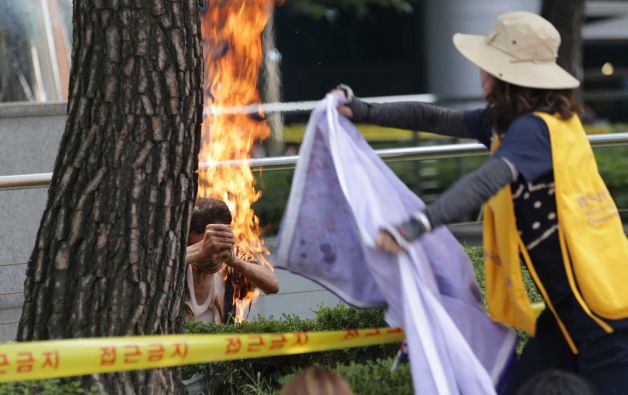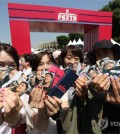- California Assembly OKs highest minimum wage in nation
- S. Korea unveils first graphic cigarette warnings
- US joins with South Korea, Japan in bid to deter North Korea
- LPGA golfer Chun In-gee finally back in action
- S. Korea won’t be top seed in final World Cup qualification round
- US men’s soccer misses 2nd straight Olympics
- US back on track in qualifying with 4-0 win over Guatemala
- High-intensity workout injuries spawn cottage industry
- CDC expands range of Zika mosquitoes into parts of Northeast
- Who knew? ‘The Walking Dead’ is helping families connect
S. Korean man, 80, sets self on fire at anti-Japan rally

A South Korean man, left, sets himself on fire as a woman tries to extinguish him during an anti-Japan rally demanding full compensation and an apology for wartime sex slaves from the Japanese government in front of the Japanese Embassy in Seoul, South Korea, Wednesday, Aug. 12, 2015. Rescue worker Woo Kyung-suk said that the 80-year-old man sustained third-degree burns on his upper body and arms and was breathing when he was carried into an emergency vehicle. The man’s motives weren’t immediately clear. (AP Photo/Lee Jin-man)
SEOUL, South Korea (AP) — An 80-year-old South Korean man was unconscious and experiencing breathing difficulties after setting himself on fire during an anti-Japan protest in Seoul on Wednesday, hospital officials said.
The rally, held in front of the Japanese Embassy and attended by hundreds of people, was staged days before the 70th anniversary of the Allied victory in World War II that freed the Korean Peninsula from Japanese colonial rule.
Kim Sun-min, who was among several people who rushed over to help put out the flames, said he didn’t notice the man, identified by police as Choi Yeon-yeol, before he set himself ablaze on a flower bed near the rally. Lumps of burned cotton and a small glass bottle that reeked of gasoline were found at the scene. The rally continued after Choi was taken to the hospital.
Choi suffered third-degree burns on his face, neck, upper body and arms and was relying on a breathing machine after his lungs deteriorated, said an official at Seoul’s Hallym University Hangang Sacred Heart Hospital, who didn’t want to be named, citing office rules.
Choi’s exact motives were not immediately clear. A five-page statement found in his bag, apparently written by himself, contained condemning remarks about Japan over its stance on issues related to its colonial rule of Korea and wartime conduct, according to Seoul police official Seo Hyeon-su.
Since 1992, activists have organized weekly protests in front of the Japanese Embassy to demand justice for South Korean women who were forced to work as sex slaves for the Japanese military during the war, and the gatherings have been mostly peaceful. The turnout was particularly high on Wednesday as the countries approached the anniversary.
Many South Koreans harbor deep resentment toward Japan over its colonial occupation. Hundreds of thousands of Koreans were forced to fight as front-line soldiers, work under slave-labor conditions or serve as prostitutes in brothels operated by the Japanese military during the war.
Such sentiment has strengthened in recent years over what South Koreans feel are attempts by Japan to downplay its wartime conduct, as well as Tokyo’s territorial claims to a set of small islets occupied by South Korea.
Protests sometimes turn violent. Scuffles with police are common and demonstrators have severed their own fingers or hurled excrement at the embassy in the past.
















